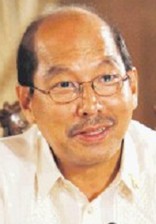“Don’tlook at us.”
It was Congress, and not Malacañang, that approved the rules tightening controls over the pork barrel funds that have lawmakers complaining about the undue hold the executive branch supposedly has over the legislature, the Department of Budget and Management (DBM) said on Thursday.
Budget Secretary Florencio Abad Jr. said the DBM did not have authority over the release of the congressional entitlements. The DBM, as with all government departments, is under the Office of the President.
For one thing, Abad said, the limit imposed on realignments of the pork barrel—or Priority Assistance Development Fund (PDAF)—was provided for under the national budget or the General Appropriations Act of 2012 that Congress passed in late 2011.
The secretary said the executive branch took the passage of the special provision as proof of the lawmakers’ dedication to transparency and accountability.
“The limits on the use of the PDAF were not decided on solely by the DBM,” Abad said in a statement.
“This agency does not wield—and has never wielded—the authority to control the release of lawmakers’ PDAF. Rather, these rules were actually approved by our very own congressmen when they reviewed the 2012 National Expenditure Program last year,” he said.
Abad’s remarks came in the wake of criticism from some congressmen that the rules had been tightened against those who were opposed to the Aquino administration.
He said Special Provision No. 6 of the 2012 GAA states that a “realignment under [the PDAF] may only be allowed once.”
A fund realignment is the act of transferring an allocation for an approved item in a project to another item.
“Limiting the number of fund realignments would allow project implementations to proceed faster, since the realignments themselves cause delays and prevent agencies from delivering critical public service in a timely fashion,” Abad said.
“When Congress approved this rule in the GAA last year, we took that as an expression of their commitment to the principle of transparency and accountability, especially in the use of public funds,” he added.
He dismissed fears the Aquino administration would use the PDAF as a tool to “manipulate” opposition lawmakers.
“The Aquino administration will not make it difficult for members of the opposition to make use of their respective PDAFs,” Abad said.
Earlier, ACT Teachers party-list Representative Antonio Tinio acknowledged the processing of the PDAF had become stricter under the Aquino administration, especially this year.
Navotas Representative Tobias Tiangco had said at the impeachment trial of Chief Justice Renato Corona that congressmen who did not sign the impeachment complaint were threatened with the withholding of their PDAF.
Iloilo Representative Janette Garin said the new PDAF rules were affecting both administration and opposition members of the House of Representatives.
“The DBM wants us to give more details, not only what projects are to be funded and who the beneficiaries are, but also a specific program with objectives,” said Garin.
But for Abad, “In the end, we aren’t just concerned about the proper and effective use of funds. We also need to ensure that the benefits from our services are indeed being felt by all Filipinos in a direct, immediate and sustainable way.” With a report from Gil C. Cabacungan
